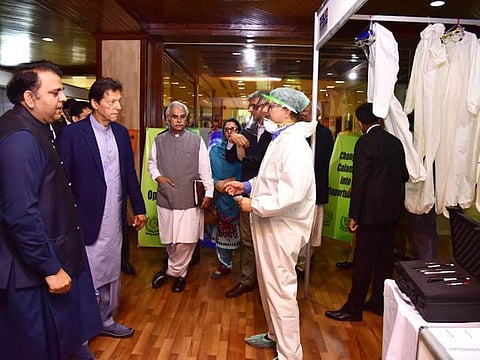Pakistan developing key medical equipment to fight COVID-19
Officials receive at least 48 proposals for locally developed mechanical ventilators

Islamabad: Pakistan is ramping up local production capacity of essential medical supplies to become secure and self-sufficient in the fight against coronavirus as the number of confirmed cases surged past 18,000.
Visiting the exhibition of medical products at the COMSTECH centre, Prime Minister Imran Khan praised the efforts of Pakistani engineers and developers who are helping on three fronts: supporting the local economy, reducing costs and helping contain COVID-19 spread.
Ministry of Science & Technology in collaboration with Pakistan Engineering Council (PEC) and others organised the exhibition to showcase the country’s potential. The exhibition titled ‘Changing Calamity into Opportunity’ featured locally produced masks, personal protective equipment (PPEs), sanitisers, disinfectants, and prototypes of ventilators by public and private organisations.
The COVID-19 crisis has provided Pakistan an opportunity to locally manufacture ventilators and other key medical equipment amid the global shortage, PM Imran remarked. The government’s current focus is knowledge economy, research and development (R&D), education, science and technology, the premier said.
Pakistani engineers contributing in fight against coronavirus
Pakistani engineers in public and private sectors are tirelessly working to contribute in the national fight against coronavirus outbreak, said Minister for Science and Technology, Fawad Hussain. Pakistan is currently producing PPEs, masks, sanitisers and disinfectants in large numbers. “The textile sector of Faisalabad is actively engaged in producing protective gear for health workers.” The local production may soon exceed local demand in which case the gear can be exported, he said. Fawad urged the government to expand the interaction between civil and military R&D terming it a critical measure in response to COVID-19 pandemic.
Producing masks and ventilators
PEC officials received at least 48 proposals for locally developed mechanical ventilators of which 13 were accepted. “Currently seven types of ventilators are in final phase of approval” which would be ready within weeks at one-third of the cost of imported ventilators. The approved list includes Corvent by Pakistan Ordnance Factories (POF), PakVent-1 by DESTO, NED ventilator, VenteLight by PAF, Nuvent by NUTECH, Dignous by DIC and Umbilizer.
Ministry of Defence helping in fight against COVID-19
Minister of Defence Production Zobaida Jalal also stepped up to the COVID challenge. In early April, the engineers at the ministry’s NRTC (National Radio and Telecommunication Corporation) repaired over 171 ventilators free of cost to cope with the shortage of equipment.
She said her ministry has now developed the capability to produce around 300,000 — 400,000 litres of sanitisers, 35,000 high quality masks and 400-500 protective suits per day. POF had so far supplied around 200,000 masks and 350 PPE suits to NDMA, while another 20,000 suits were under preparation.
NRTC has also developed thermal cameras, walk through gates and VG70 ventilators and would soon begin the distribution. The minister urged for active collaboration between ministries to effectively combat COVID-19 pandemic.
Sign up for the Daily Briefing
Get the latest news and updates straight to your inbox





